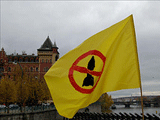Radar shield: Small-time fate
By Jeremy Druker for ISN
Ever since Barack Obama won the US presidency, political pundits in Central Europe have predicted that the days of George W Bush’s pet project - a missile defense shield - were numbered.
Obama’s refusal to indicate his unqualified support during the election campaign; the skeptical view of highly placed Democrats in Washington; and the mounting financial crisis have all called into question the likelihood that the shield would ever see the light of day.
In the end, however, the shield’s fate could have come down to the decision of a far less famous politician last week.
In a surprise move, Michal Pohanka, an independent Czech parliamentary deputy, resigned his seat on 11 December, definitively eliminating a key vote that the governing coalition had counted on in its plan to push an agreement on the shield through the lower house.
The Senate has already approved the two treaties signed with the US to place a radar station in a town 90 kilometers southwest of Prague, including a Status of Forces Agreement (SOFA) deal on the stationing of foreign soldiers on Czech territory. The lower house is now expected to vote early next year.
Pohanka, initially elected on the list of the Social Democrats (CSSD), broke party ranks in early 2007, and refused to vote against the formation of a center-right governing coalition. His vote and that of another CSSD defector were crucial because the June 2006 elections had ended in a dead heat between the center-right and left, leading to a stalemate that could not produce a stable government for months.
After striking a “toleration” deal with Prime Minister Mirek Topolanek, Pohanka, who subsequently left the CSSD, had voted with the government on key legislation since then. But the situation was always tenuous, and the current predicament is exactly the risk that Topolanek assumed when he decided to stake the government’s future on such shaky grounds.
Though Pohanka had expressed reservations over the radar plans, most political observers expected him to again follow the government line when it counted. Evidently, they were wrong, as he said that the approaching vote had influenced the timing of his departure as he would have had difficulty helping this time around.
Some newspaper columnists had a different interpretation, contending that the Social Democrats had bought off Pohanka with a promise of a lucrative post in one of the regions where they triumphed in regional elections this fall. Accusations about political corruption have become commonplace in a country where the rise and fall of governments (and every piece of reform legislation) now comes down to the mood on any given day of a handful of now unaffiliated parliamentary deputies.
That won’t be the case with Pohanka’s replacement on the benches of the lower house. A long-term, loyal CSSD member, she has already said that she would vote against the radar station.
Every vote counts because the government currently has only 96 seats in the lower house and the opposition 97, with seven unaffiliated deputies who have sided with the government at times. The government needs to find 101 votes to pass the radar agreements, a difficult, if not insurmountable, task with one Social Democrat, two formerly Green deputies (who recently left their parliamentary club), and Education Minister Ondrej Liska (also from the Green Party) all either defiantly against the radar station or wavering with their votes.
That would seem to make it far easier for the Social Democrats to block an agreement with just 100 votes.
The CSSD also recently unveiled another strategy, one designed to even prevent a vote from taking place. On the same day Pohanka resigned, CSSD officials said they would seek a Constitutional Court ruling on the legality of the treaties. If the Court agrees to hear the case, that could take months, delaying yet again a vote in the lower house.
If that doesn’t happen, it looks likely that a vote could finally take place in February, on the same agenda as a decision on the Lisbon Treaty, the new version of the EU Constitution aimed at revamping the decision-making process in Brussels. A resolution at the recent congress of the ruling Civic Democrats (ODS) called on the party’s legislators to put the radar deal to a vote before Lisbon.
In the end, approval of the radar station could come down to some old-fashioning horse-trading, with ODS and some of its hard-core Euroskeptic parliamentarians supporting Lisbon in return for the Social Democrats caving in on the radar station. For the moment, however, the CSSD chairman, Jiri Paroubek, has rejected that possibility, but anything seems possible in the current political climate.
In the wake of Pohanka’s resignation, the daily Mlada fronta DNES took the opportunity to point out the power of a single individual to steer the course of history: “It’s actually comical that just one deserter, who suddenly tossed his mandate to the side, can have such a crushing impact on an essential thing of international importance - because of which the nation is divided, Europe a little also, and Russia even redirecting its rockets.”
That was a reference to the Kremlin’s anger over the plans for radar station and the related stationing of 10 missile interceptors across the border in Poland. Questioning US claims that the missile defense shield would simply protect North America and Europe against “rogue states” (such as Iran), Moscow says the system is aimed at containing Russia and has threatened to deploy missiles to Kaliningrad.
The 39-year-old Pohanka, a doctor by training, can ignore such global issues from now on. He has said he plans to return to his original profession in the coming months - and no doubt quieter times will follow.
